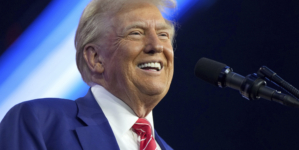-
Tears at Reason Behind Rescue Dog’s Dramatic Reaction To Being Left Outside - 20 mins ago
-
From the Surf to the Sermon: The Christian Surfers of Costa Rica - 33 mins ago
-
Who Is Stephen Miran? What Trump Adviser Pick Has Said About the Economy - 55 mins ago
-
These Spiritual Democrats Urge Their Party to Take a Leap of Faith - about 1 hour ago
-
Matt Gaetz Ethics Committee Report: What to Expect in Monday’s Release - 2 hours ago
-
Visitors to Riverside’s Festival of Lights warned of parking scam - 2 hours ago
-
Letter Calling for Tracking People of Color Circulates in an Oregon County - 2 hours ago
-
Eagles’ Jalen Hurts Officially Ruled Out With Concussion - 2 hours ago
-
Possible rain, high surf forecast for Los Angeles area in holiday week - 2 hours ago
-
Tiger Woods Son Charlie Hits Epic Hole in One While Playing Alongside Father - 3 hours ago
Can deputies be forced to show investigators their tattoos? Not yet, says appeals court
A California appeals court said Wednesday that the county watchdog cannot force Los Angeles County sheriff’s deputies to reveal suspected deputy gang tattoos or to answer questions about the inked groups – at least not until the county has bargained with the deputies’ labor unions.
In a 28-page opinion, the Second Division of the California Court of Appeals said the public interest in “ridding law enforcement agencies of deputy gangs is substantial,” but that there was not “any evidence” to suggest labor negotiations would take so long as to meaningfully delay an investigation into the groups.
The legal dispute that led to this week’s ruling started last year, after the county Office of Inspector General demanded that dozens of deputies show their tattoos and name other suspected deputy gang members. Employee unions promptly struck back with a May 2023 lawsuit as well as a formal labor complaint.
The union representing rank-and-file deputies — the Assn. for Los Angeles Deputy Sheriffs — lauded Wednesday’s decision.
“As other courts and the county’s labor board have previously ruled, the Court of Appeals today found that the inspector general is not above the law,” union President Richard Pippin told The Times. “All ALADS wanted was a voice in the process, to sit down with the county and negotiate over what the rules would be for investigations conducted by the inspector general.”
Inspector General Max Huntsman also framed the ruling as a positive.
“The court found that ‘the public’s interest in ridding law enforcement of gangs is ‘substantial’ and that an inspector general’s decision to investigate is nonnegotiable,” he told The Times late Wednesday. “As the court found, the OIG must consult with unions on the effects of an investigation but may reject their proposals. My office’s investigations will continue after the ‘expeditious’ bargaining described by the court.”
The Sheriff’s Department said in a statement that the ruling wouldn’t affect its ongoing efforts to investigate “allegations of law enforcement gang activity” and that officials “encourage” deputies to “engage with” oversight bodies.
It is not clear whether the county intends to appeal the decision to the California Supreme Court, and the county deferred comment to the Sheriff’s Department.
The department has long faced allegations about secretive deputy groups running amok in certain stations and jails, controlling command staff and promoting a culture of violence. A Loyola Marymount University report released in 2021 identified at least 18 such groups that have existed over the last five decades, including one known as the Executioners and another known as the Banditos.
Members of the former are alleged to sport tattoos of a skull with Nazi imagery and an AK-47, while members of the latter are allegedly known for their matching tattoos of a skeleton outfitted with a sombrero, bandolier and pistol.
In January 2020, as part of an effort to improve oversight of the Sheriff’s Department, the county adopted an ordinance that gave subpoena power to certain oversight officials. But a few months later, the deputies union filed a labor complaint arguing that the county needed to bargain over the effects of the new ordinance before forcing deputies to comply with it.
In late 2022, the Los Angeles County Employee Relations Commission sided with the union, saying that deputies didn’t have to obey subpoenas served under the new ordinance until the bargaining process was over.
But then in May 2023 — before bargaining concluded — Huntsman’s office sent letters to 35 deputies suspected of being members of either the Executioners or the Banditos.
The OIG letters ordered the deputies — whose names have not been publicly released — to show their tattoos, provide names of any other deputies sporting similar ink and answer questions about whether they’d ever been invited to join a group related to their tattoos. Because the letters weren’t official subpoenas, it wasn’t clear whether deputies would actually face any consequences for ignoring them.
But less than a week later, Sheriff Robert Luna sent a department-wide email directing staff to comply with the OIG request. Any employees who obstructed or delayed an investigation, the email said, could be disciplined or fired under county policies.
The unions took issue with that, filing the labor complaint and lawsuit that same month, accusing the county of violating deputies’ 4th and 5th Amendment rights as well as their privacy rights outlined in the California Constitution. The union also argued that planned interviews constituted “significant and adverse changes to the terms and conditions of employment” and thus required bargaining.
Ultimately, the lower court rejected most of the union’s issues but sided with them on the labor concerns, agreeing that the forced interviews were new conditions of employment that needed to be bargained and writing that there was “no compelling need for immediate investigation” before that.
The county appealed the decision in September, and the appeals court issued its ruling this week.
In the interim, the two sides conferred and came to an agreement on a different policy — but one that also mentions the need to cooperate with oversight investigations. In September, the department rolled out its long-awaited policy banning deputy gangs, which included a paragraph noting that the department would cooperate with inspector general investigations.
“Employees are required to participate in these investigations,” the policy says, “answer questions, and do so honestly.” It’s not clear how that policy could affect the ongoing dispute over whether deputies must reveal their tattoos.
Source link




















